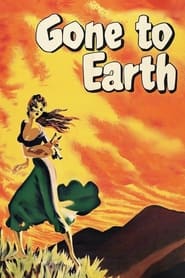Surprisingly humdrum for an Archers film, it only becomes recognisable as such in the final 20 minutes. Our heroine is the kind of wild, close-to-nature country girl that Stella Gibbons parodied so well in the character of Elfine Starkadder, and the plot chiefly concerns who gets to 'tame' this Lyra Silvertongue of Shropshire. Will it be the cruel and shockingly predatory squire Reddin or the respectable yet patronising parson Marston? It's the moral and sexual quandary perhaps more suited for Poldark or neo-romantic romance novels, and the screenplay mostly fails to breathe life into these well-worn ideas. We should probably be charitable to the original novel and infer that the names "Hazel Woodus", "Foxy" and "Reddin" were chosen not for verisimilitude, but rather for what they poetically evoke in the style of Dickens. Even the use of fox hunting as a potent metaphor for sexual conquest was handled more adeptly in the Archer's own Black Narcissus (1947) — and the remark allusive of sexual violence by Hazel to Reddin ("you has blood on ye") surely didn't have to made twice. Alas, the performances aren't compelling enough to compensate for these and other drawbacks, and our stand-in for Miss Tess Durbeyfield has the sort of pseudo-regional accent that presumably counted as wildly exotic for 1950. It's essentially in the "cor, blimey guv'nor" vein transplanted from St Mary-le-Blow to the Welsh borders. Gone to Earth starts to get interesting when Hazel reminds Reddin that he cried during sex, but we are quickly returned to the kind of stark yet somehow spiritless red-drenched images of Hazel's untamed hair looking a bit too much like Sister Ruth in her civvies. Still, remarkable use of a real fox as Hazel's dæmon and some wonderful horses and dogs as well, although I don't quite like to ponder how they were all treated during filming.
Although written in 1917, the basis of Mary Webb's story is Victorian melodrama: the plot is pure cliché, reflecting a simplistic preoccupation with the battle between good and evil, and ending in a moral victory for good. Webb's significant achievement is to transform this basic dualism into a complex, multi-layered narrative in which the conventional polarities are reversed, the moralistic edges blurred, and and entire social and world order brought into question. A profound pessimism pervades the book, written towards the end of the First World War and suffused with violent, painful imagery as life and hope are trampled underfoot in a merciless drive towards death.[…]
The Technicolor process seems to have provided Powell and Pressburger with the means both to condense and bring to life the vibrant colour symbolism of the novel's long descriptive passages. When Hazel buys her new green dress, it is a hopeful sign of the quickening of life[.] The moment she enters Reddin's world, he gives her a red dress, and from this point red begins to dominate the screen, from the flowers Reddin tramples underfoot when he seduces Hazel to the red which suffuses the sky whenever she is with him[.] And these connotations of violence and death which prefigure Hazel's end are again related to institutions, in the red jackets of the upper-class huntsmen who finally ride her down.
[…]
During his pursuit of Hazel, Reddin watches her constantly, his dark looks a chilling evocation of his desire to possess her. Edward's look, though different, is no less pervasive. His 'spiritual' stare into the distance mirrors the paternalistic look with which he gazes at Hazel. But neither man really 'sees' her for what she is, and at the crucial moment, when Hazel is running for her life from the hounds, neither of them sees her until it is too late.
— Pam Cook (Monthly Film Bullitin)
As the film neared completion, the British Field Sports Society took objection to its perceived anti blood-sports stance and members were advised not to lend hunting packs to the production company. Powell appealed for help in The Times (October 1949) and a Cardiganshire farmer finally lent his own hounds to finish the shoot.
— Trish Sheil (BFI Screenonline)

